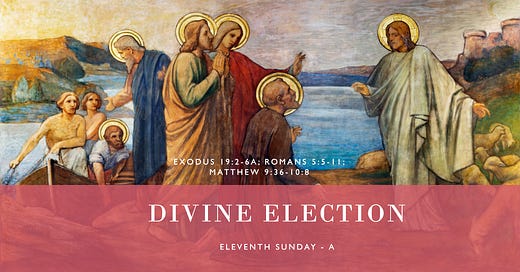Exodus 19:2-6a; Romans 5:5-11; Matthew 9:36-10:8
Divine election is the theme of the liturgy of the Word. God chose the nation of Israel from among all the nations to be His "treasured possession" (Ex. 19:5), Jesus chose the twelve apostles from among those who follow him (Matt. 10:1; cf. Luke 6:13) and finally those who have accepted the gospel preached by the apostles were among the first to experience the salvific fruits of Christ's death (Rom. 5:8).
The crowds that Jesus saw were "harassed and helpless" (Matt. 9:36), like Israel who was oppressed in Egypt (Ex. 1:13-14, 2:23). In both cases, God saw the tragic situation of his people (Ex. 2:25; Matt. 9:36) and acted. Just as the calling of Moses (Ex. 3:7-10) was a prelude to lead the nation out of slavery in Egypt, the call of the apostles was a prelude to lead humanity out of slavery to sin. "The harvest is plentiful" (Matt. 9:37). The world is ready for the Gospel and the Lord of the harvest sends his workers to his harvest (Matt. 9:38).
The apostles were chosen in answer to the prayer addressed to the Lord of the harvest for the workers (Matt. 9:38; Luke 6:12). From spectators, they became participants in Jesus' mission. Just as the first stage in the history of salvation was the election of Israel, the first stage in the mission of the apostles was to save the sheep lost from the house of Israel (Mt 10:6). But those sheep did not only lost their way, they were ruined and perishing, and the apostles were to heal them and restore them to life. That is why they were endowed with such incredible power: "Heal the sick, raise the dead, cleanse lepers, cast out demons" (Matt. 10:8).
"You yourselves have seen what I did to the Egyptians, and how I bore you on eagles' wings and brought you to myself" (Ex. 19:4). Israel's liberation from slavery in Egypt was an experience of the coming of God's kingship. The lost sheep of the house of Israel experienced the same. Through the mission of Christ's apostles, God's kingdom came to them in the form of a miracle of deliverance from sickness, death, and spiritual bondage (Matt. 10:7). Through the mission of the Church, the kingdom of God has also come to us who have believed in Christ. We too have seen how God destroyed sin and has reconciled us to himself through the death of his Son (Rom 5:10). Wherever God's kingdom draws nearer, everything returns to health and life.
After the ratification of the covenant on Mount Sinai (Ex. 24:7-8), Israel became God's treasured possession (Ex. 19:5). The Psalmist proclaims this truth with the words, "We are his people and the sheep of his pasture" (Ps. 100:3). We who believe in Christ are also God's treasured possession. God made with us a new and everlasting covenant in the blood of his Son (Matt. 26:28). Called out of darkness to God's miraculous light, like Israel of old, we are "a chosen race, a royal priesthood, a holy nation, a people for his own possession" (1 Pet. 2:9).
God's election is a grace. It was not Israel who chose God, it was God who chose Israel, and the Twelve did not choose Jesus, but Jesus chose the Twelve (John 15:16). And why did God choose Israel from among all the nations of the earth? Neither because of their number nor because of their righteousness, quite the opposite. They were the fewest of all people and stiff-necked (Deut. 7:7; 9:6). The motive for God's election is love (Deut. 7:8). The same applies to us. St. Paul writes: "God shows his love for us in that while we were still sinners, Christ died for us" (Rom. 5:8).
Today, great crowds of people are still being "harassed and helpless, like sheep without a shepherd" (Matt. 9:36) and it is our turn to go and proclaim to them the liberating power of God's kingdom.




